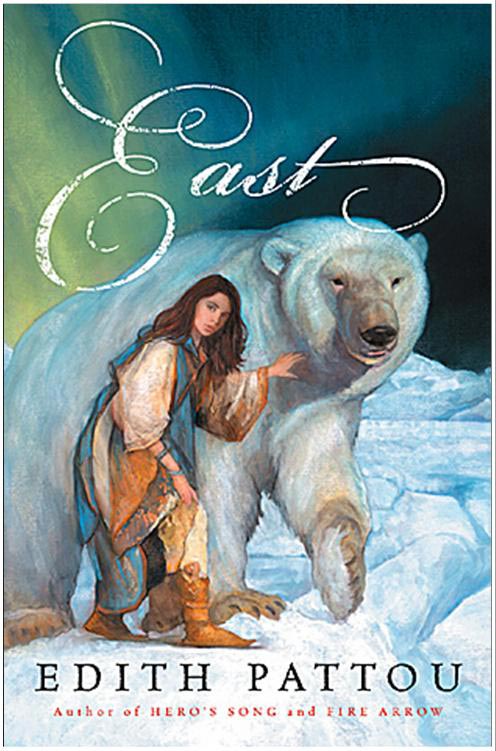East
by Edith Pattou
"Rubbing linseed oil into my blistered hands, I thought wistfully of how magic lets up skip over the steps of things. This is what makes it so appealing. But, I thought, the steps of things are where life is truly found, in doing the day-to-day tasks. Caught up in the world of enchantment as I had been at the castle, it had been the routine things I had missed most, which was why I had set up that laundry room and insisted on doing my own washing. But I had missed so much."
An immersive, detailed and faithful YA retelling of the fairy tale "East of the Sun and West of the Moon," East tells the story of a girl named Rose who, by an accident of birth, is destined to have wandering feet. She is an adventurous child, much to the chagrin of her family, and attracts the attention of a lone white bear. One night the white bear visits them, and states he will bring their poor family prosperity and health if he can have their youngest daughter Rose. Rose makes the sacrifice against her family's wishes and travels with the bear to his lonely mountain castle. She is surprised to discover that each night a naked man visits her and lies next to her in bed, but never says a word. A great mystery surrounds her imprisonment, but, when her curiosity gets the best of her, her transgression has horrible consequences, and she must undertake an impossible journey to make everything right.
I was nervous about this book at first. It is lauded as one of the best fairy tale adaptations on the market, but I worried it would be superficial. Boy, was I wrong. Pattou is a master of adaptation. She remains faithful to the story, while giving life and breath and texture to the familiar tale. She takes the symbolic compass directions mentioned in the title and makes them reverberate throughout the book, creating a mythology of birth direction (like the zodiac) that determines your personality and your fate. Rose was born to replace her dead sister, who was an East, and thus mild. But Rose was accidentally born a North, which gave her an itch for exploration. Her father is a map maker, and creates an artistic compass rose for each member of the family.
She also takes some of the more abstract elements of the tales, like traveling on the north wind, and finds ways to practically embody that in a real adventure: Rose takes a turbulent sea voyage with a drunken captain. She also rather deviates from the story at the end, but creates a compelling climax.
The story is set in 1500s Njord. They travel through countries like Danemark, Fransk and Arktisk, which are apparently the Norwegian names for Norway, Denmark, France and the Arctic. It was fascinating to explore a country that is not England or Italy in the 1500s. The names grounded it in time and space, but their unfamiliarity still give it a fairy tale quality.
Pattou structures the story with multiple narrators. We hear the story from the Father, Neddy (her brother), Rose, the Troll Queen who enchanted the white bear, and the White Bear himself. They each have a distinctive narrative voice; the White Bear, as it is painful for him to talk in bear form, speaks in short sentences and images, like poetry. She has a talent for selecting which narrator will tell what section of the story. We hear Rose's struggle to make her decision to go with the White Bear from Rose. We see the aftermath of her struggle from Neddy, and we see the actual surprise of her leaving from her Father, each perspective bringing startling and heart-wrenching elements to the story.
Also, I have been struggling with what my image of a kick-ass heroine is. Is she just a character with awesome fighting skills? With inner strength? Who speaks her mind? This book clinched it for me. A kick-ass heroine is someone who has an impossible task ahead of her, sucks it up, and does what needs to be done, even if it is crossing a narrow ice bridge over deadly water, or rebuilding a boat and learning how to sail it while the captain wallows in despair and drink, or traveling for weeks in the arctic alone to rectify a mistake. Rose is a kick-ass heroine and a role model for girls of all ages.
Books Like This:
Howl's Moving Castle by Diana Wynne Jones
Fairest by Gail Carson Levine
Tender Morsels by Margo Lanagan


